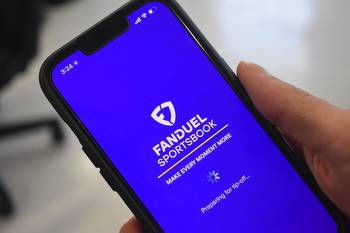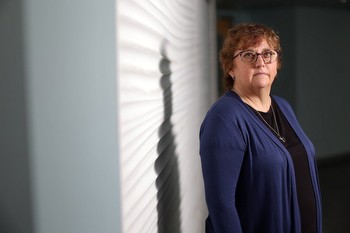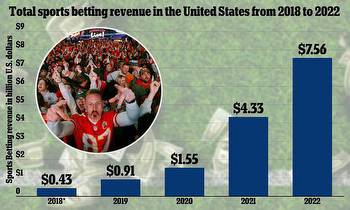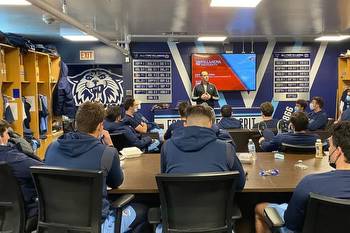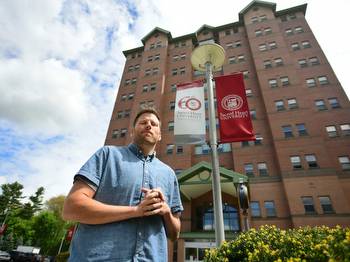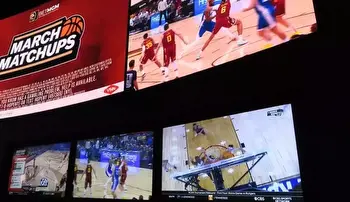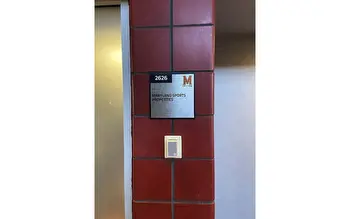I-TEAM: Sports Betting/Online Gambling Addictions growing on CT college campuses

(WFSB) - Tonight the I-Team digs into the impact of legalized sports betting in Connecticut. We found an alarming increase in gambling addiction across the state, especially on college campuses.
Sports Betting has become so popular in Connecticut that more than $205,000,000 worth of sports bets were placed in the state just this past December. Sports Betting was legalized in Connecticut in October of 2021.
Since it became legal, total contacts to the CT Council on Problem Gambling helpline have increased 93%, a majority being college-aged or slightly older young men.
None of the people we interviewed think gambling should be illegal, they just want the public to be more aware of the risks and the help available.
For one 21-year-old the I-Team interviewed, who wanted to remain anonymous, Sports Betting was just another hobby he picked up at Quinnipiac University. Legally, you have to be 21 to bet in Connecticut.
“I would say several times a week, I do sports bet,” says the student. “My friends were doing it and I saw all the fun they were having so I wanted to try it myself.”
While he says he knows he can stop at any point, the reality for many others is more complicated.
“Right now I would say the landscape on college campuses is, it’s almost part of the experience. That’s how enmeshed it is,” says Brian Dolan.
COLLEGIATE RECOVERY PROGRAM:
It’s been 7 years since Brian Dolan placed a bet. ”I was really close to letting gambling and drug and alcohol addiction take my life,” says Dolan.
That’s because when Dolan was a student at Sacred Heart University, he struggled with a severe gambling addiction. ”I used to lie. ‘Hey Mom, I need $500 for textbooks.’ That money was to go gambling,” says Dolan. “It’s a long story, but I was involved in gambling at a really young age. It gave me a sense of community, until it didn’t.”
His recovery led him back to Sacred Heart to help others overcome drug, alcohol and gambling addiction through their Collegiate Recovery Program.
“We definitely see more and more gambling on campus. It’s the reason I work here at Sacred Heart, because I think for a long time, higher ed shied away from these conversations. I wouldn’t say the reason we have a collegiate recovery program or are addressing gambling going on is because we have these higher rates of it here at Sacred Heart. We’re progressive and we understand that this is more and more involved in the collegiate experience,” says Dolan.
With an unprecedented level of access and advertising, approximately 69% of college students nationwide bet on sports in the past year, according to the National Council on Problem Gambling.
“When I was in college, you had to seek it out. You needed to find a bookie,” says Dolan. “Today, you’ve increased accessibility. You used to have to know a guy or knew a guy that knew a guy. And now it’s like, I can go on my phone and place a bet - fast.”
The International Center for Responsible Gaming estimates 6% of college students in the US have a serious gambling problem.
By comparison, only 1% of adults are problem gamblers.
“I’ll get a call from a family, you know, not necessarily here at Sacred Heart but at schools - Ivy League schools, Big Ten schools. My son just lost $50,000 - what do I do?,” says Dolan, who not only works in addiction issues at the University but does private work in the gambling addiction field.
Dolan says he was lucky enough to ask for help.
“That’s the hard thing, especially with young males. They tell me, ‘I have a problem with this but it also connects me with many of my classmates, how do I own this, I can talk to you but I can’t say it in front of the rest of the dorm.’ We’re just trying to normalize these conversations, you know.”
CT COUNCIL ON PROBLEM GAMBLING: HOW TO RECOGNIZE A PROBLEM:
Diana Goode is the Executive Director for the CT Council on Problem Gambling. Since it became legal, total contacts to the CT Council on Problem Gambling helpline have increased 93%, especially college men.
“One of the strange things that we’ve just started to see now, is we’re getting more calls from people who are calling and saying ‘I’m not a problem gambler but I can see it could be a problem potentially for me, so what do I do?,’” says Goode.
But how does someone recognize they may have a problem?
“Once somebody really feels like it is impairing their basic needs or if I’m skipping school because I’m gambling too much, it’s causing interpersonal conflict,” says Dolan.
“If you’re obsessed with gambling, thinking about it all the time, you’re lying to your friends about it,” says Goode. Or recognize their loved one is facing an addiction. “A lot of times kids are betting their college funds or are using their parents’ credit cards. So that’s a great way to be able to monitor where their kids are spending money,” says Goode. “Also having these dialogues with their kids, we ask about everything else,” Goode says the council has given grants to nine colleges in Connecticut, including Sacred Heart, to work with these schools to address problem gambling.
“We’re not telling them, don’t gamble, we’re just saying if you’re gambling and there’s a problem, there’s a helpline to call and there is treatment available,” says Goode.
For example, Jonathan Pohl, the Wellness Education Coordinator at CCSU says they used the grant to raise awareness of problem gambling and encourage students who choose to gamble to take steps to do so responsibly.
Pohl says, “We have not had students come forward to work with us directly, but we provided students the number for the CCPG hotline through written materials and on promotional items (stress relievers, t-shirts, and car coasters). The t-shirts had a western theme which attracted a number of students, the car coasters focused on commuters – 80% of our student population, and the stress relievers were in the shape of a cowboy hat.”
They also hosted a My Best Self health fair, a fair that focuses on SAMHSA’s (Substance Abuse and Mental Health Services Administration) 8 factors of Wellness.
Information from the CT Council on Problem Gambling:
People can call and speak with a trained specialist for support and resources for confidential help 24 hours and 7 days a week for individuals and families. Call 1-888-789-7777 or chatwww.ccpg.org.
Not everyone who gambles has a problem, but everyone can benefit from using strategies to play safer if they choose to do so. Here are tips:
· Set a budget & stick to it.
· Set time limits & take breaks.
· Gamble for entertainment & if it’s not fun stop playing.
· Understand how the games work including odds.
· Avoid gambling when upset or frustrated.
· Limit or avoid alcohol/other substances while gambling.
· Balance gambling with other activities.
Before you choose to gamble, know the risks. Visit www.responsibleplayct.org for safer gambling strategies.














